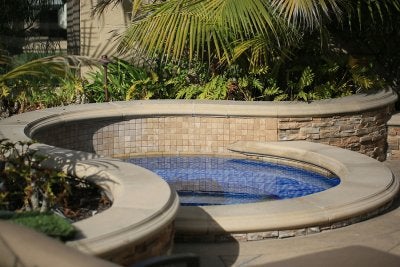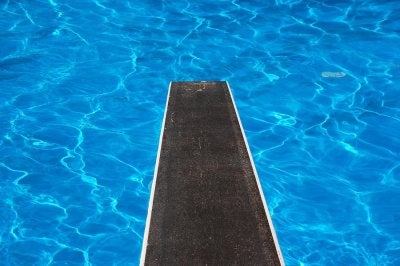-
Checking the Chemical Balance of Your Hot Tub
After scheduling your hot tub installation near Salt Lake City, you can look forward to countless relaxing hours with your new investment. Keep it in like-new condition by checking the chemical balance regularly . If you use chlorine or bromine, you should test the water every two days. If you use a non-chemical cleaning system, like ozone, you should test the water every week. You can also have a pool contractor perform a professional analysis every month. Pool contractors can use tests that are far more advanced than the test strips you use.
Use a clean plastic or glass container to collect water samples, and don’t use this container for any other purpose, as this will affect the results. Holding the container, reach out as far to the middle of the hot tub as you can. Submerge the container as deep as it will go when the water level is at about your elbow. To check the sample, follow the instructions on your test strips or liquid test kit. If you’re taking the sample to a swimming pool company for testing, secure the lid tightly and take it over right away. If the test is delayed or the sample is allowed to sit in a hot car, the results can be inaccurate.

-
Cleaning Your Pool After a Rainy Day
An in-ground pool at your home in Salt Lake City gives you amazing opportunities for relaxation, recreation, and family fun, but swimming pool maintenance is not for the faint of heart. It takes a lot of work to keep your pool in good condition. After a heavy rainstorm, you might have dozens of pool-related tasks to deal with. Make things easier on yourself by scheduling professional pool maintenance services.
Watch this featured video to see how your swimming pool company will clean your pool after a rainstorm. The rain might have brought down lots of leaves that need to be skimmed. Dirt can settle into the bottom of the pool, the chlorine can zero out, and the pH level will likely be undesirable. The contractor will add the necessary chemicals, clean out the filters, drain excess water, and empty the skimmer basket to get the water sparkling again.
-
Making Your Pool Safe for Diving
These days, many pool owners have decided to eliminate the diving board entirely. This is primarily due to safety concerns, although some people choose to avoid diving boards for aesthetic reasons. Diving can still be a thrilling part of the home pool experience, however, as long as you inform the swimming pool builder in Salt Lake City that you intend to use it for this purpose. Your pool contractor will discuss applicable safety codes with you to ensure your pool meets the safety standards.
Pool Length and Width

A pool will only be safe to dive in if it meets the minimum length and width standards. The American National Standard for Residential In-Ground Swimming Pools requires that all home pools with a diving board be at least 16 feet wide and 32 feet long.
Pool Depth
Depth is a crucial consideration for diving pools. At the deep end where the diving board will be installed, the pool must have a hopper that is at least eight feet deep. The hopper is the deepest part of the pool. However, competitive divers should ideally have a deeper pool for safety. Your pool contractor will let you know what the maximum depth available is.
Wall Slopes
Slope is another significant safety consideration. The code for residential pools prohibits wall slopes greater than a 1:5 slope ratio to a transition point. This transition point shouldn’t be any less than two feet, nine inches beneath the waterline.
Diving Boards
The diving board you select depends in part on the type of pool you have. If you have a saltwater pool, you’ll need a diving board that is capable of resisting rust. It’s possible to have a board as long as 10 feet if your pool is large and deep enough, but generally, only competitive divers would select a board this long. Most pool owners install a six-foot or eight-foot diving board, depending on the size of the pool.
Safety Rules
Your swimming pool builders can make your diving pool as safe as possible, but a good design and solid construction don’t override the need for consistently enforced safety rules. Divers should only jump off the end of the board, not the side, and no horseplay should be tolerated on or near the diving equipment. Children should have adult supervision at all times, and no one should swim or dive without a buddy present.
-
Swimming Pool Maintenance FAQs
Becoming a new pool owner is exciting. Dealing with daily pool maintenance is somewhat less thrilling. When you imagined having your own pool at home, you probably thought about how nice it would be to relax on a float on a hot day, get more exercise swimming laps, and give the kids a place to play outdoors. Weekly shock treatments and daily debris skimming probably wasn’t part of your daydream. But, the good news is that you don’t have to manage it all by yourself. A pool contractor in Salt Lake City will give you all the information you need to make decisions about your professional maintenance schedule.
What’s the easiest way to stay on top of pool maintenance?

The easiest, hassle-free way to keep your pool at optimum conditions is to hire a swimming pool company to handle your maintenance tasks for you. Even if you do schedule regular services, you’ll probably want to handle a few minor tasks yourself. Create a written maintenance schedule, which might look something like this:
- Skim debris daily
- Vacuum once weekly
- Run the pump 10 to 12 hours daily
- Chemically treat twice weekly
- Shock once weekly
- Do safety checks of equipment every other month
Of course, your own maintenance list won’t replace professional services, as these are only some of the tasks that need to be done regularly.
How can I balance the calcium hardness?
Hard water makes your pool cloudy and can cause sediment to accumulate inside the plumbing. Water that’s too soft is corrosive. Eventually, it can corrode the metal and crumble the concrete. Ideally, you should keep the calcium hardness at about the middle of the 150 to 400 ppm range. Check the level every one to two weeks. Raise the level simply by adding calcium chloride. Lower the level by draining and replacing some of the water, or by using a flocculant. A flocculant will clump the extra calcium, and you can then remove it by cleaning the walls and bottom of the pool, and then backwashing and cleaning the filter.
How can I keep ducks out of my pool?
Ducks are certainly cute, but they’re also messy, and letting them use your pool will make your pool maintenance tasks more of a headache. Perhaps the least expensive way to duck-proof your lap pool is to introduce some of their natural predators. Find pool floats that mimic the size and appearance of alligators, snakes, dolphins, or killer whales. Leave the floats in the water whenever you aren’t swimming.
RECENT POSTS
categories
- Uncategorized
- Hot Tub Installation
- Swimming Pool Installations
- Swimming Pool Design
- In Ground Pools
- Swimming Pool Maintenance
- Swimming Pool Service
- Swimming Pool Repair
- Outdoor Fireplace
- Outdoor Fire Pit
- Pool Safety
- Deep Blue Pools and Spas
- Exercise
- Swimming
- Outdoor Kitchen
- Pool Chemicals
- Chlorine Levels
- Water Feature
- Burning Calories
- Pool Contractor
